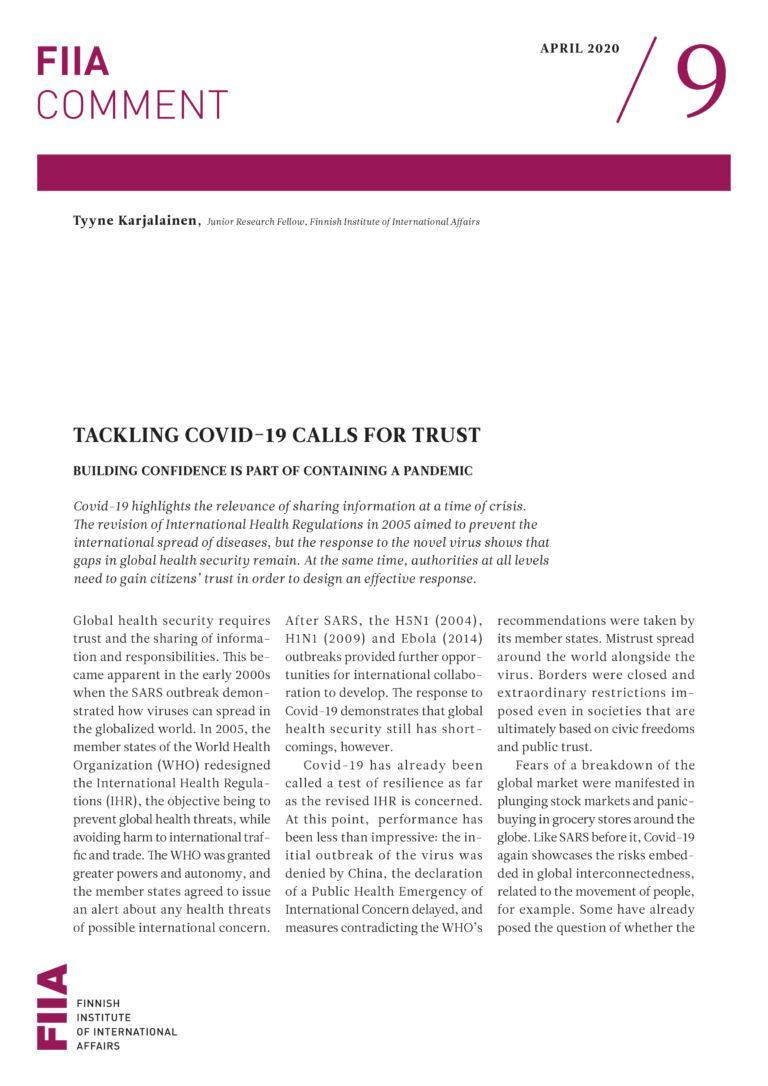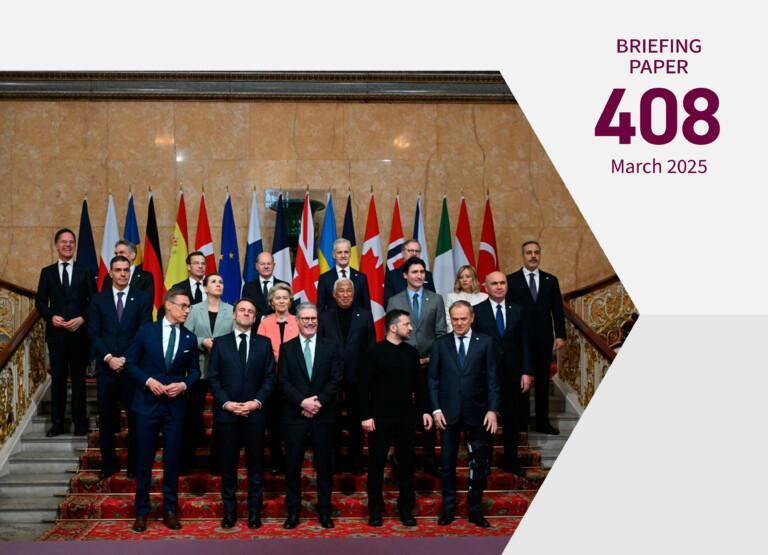
Covid-19 highlights the relevance of sharing information at a time of crisis. The revision of International Health Regulations in 2005 aimed to prevent the international spread of diseases, but the response to the novel virus shows that gaps in global health security remain. At the same time, authorities at all levels need to gain citizens’ trust in order to design an effective response.
Global health security requires trust and the sharing of information and responsibilities. This became apparent in the early 2000s when the SARS outbreak demonstrated how viruses can spread in the globalized world. In 2005, the member states of the World Health Organization (WHO) redesigned the International Health Regulations (IHR), the objective being to prevent global health threats, while avoiding harm to international traffic and trade. The WHO was granted greater powers and autonomy, and the member states agreed to issue an alert about any health threats of possible international concern. After SARS, the H5N1 (2004), H1N1 (2009) and Ebola (2014) outbreaks provided further opportunities for international collaboration to develop. The response to Covid-19 demonstrates that global health security still has shortcomings, however.
Covid-19 has already been called a test of resilience as far as the revised IHR is concerned. At this point, performance has been less than impressive: the initial outbreak of the virus was denied by China, the declaration of a Public Health Emergency of International Concern delayed, and measures contradicting the WHO’s recommendations were taken by its member states. Mistrust spread around the world alongside the virus. Borders were closed and extraordinary restrictions imposed even in societies that are ultimately based on civic freedoms and public trust.
Fears of a breakdown of the global market were manifested in plunging stock markets and panic-buying in grocery stores around the globe. Like SARS before it, Covid-19 again showcases the risks embedded in global interconnectedness, related to the movement of people, for example. Some have already posed the question of whether the novel virus will be a death blow to globalization as we know it and reinforce nationalistic thinking and protectionism.
The EU has already experienced a wave of closures of internal borders, in addition to the closing of external Schengen borders. The US set the trend, imposing an extraordinary travel ban on arrivals from Europe. EU member states have taken anti-epidemic measures rather independently, despite the support and coordinative role of the Commission. In general, this is unsurprising taking into account that health is a national competence and member states duly bear primary responsibility for providing it. The European Centre for Disease Prevention and Control (ECDC) has played a role in building an EU-level response through monitoring and providing risk assessment and advice to member states and the Commission.
However, critics argue that member states have failed to coordinate their actions and show solidarity, especially when Italy was in need of assistance. National export restrictions on health products were criticized for undermining the common fight against the virus. It is, however, too early to judge the EU-level response to Covid-19: for most of the Union, the test is still ongoing and a multitude of EU bodies and mechanisms are currently taking action.
Fighting pandemics also calls for trust at a national level. The success of anti-epidemic measures requires public trust towards health and science institutions, government and the media. Low trust is found to be linked to higher risk perceptions amongst citizens. At the same time, citizens appear less likely to stick to given guidelines if they doubt that government measures constitute a genuine crisis response. Sharing information is one of the building blocks of trust at a time of crisis. Lessons from the fight against Ebola show that doubts about official information can undermine the crisis response. Mistrust increases if authorities do not communicate openly about the spread of the virus. Civic knowledge about disease transmission also serves as a preventative factor and supports public intervention.
Communication by state leaders and officials about Covid-19 has been criticized in China and the US, for example. Confusing information and mixed messages from authorities are feared to hamper the work of health officials. In the era of social media, the question of whose information is trusted is even more relevant. Crisis communication now has to adjust to the new normal whereby citizens receive information from a great number of sources. The recommendation to rely on official information is outdated in many corners of the globe: even authorities need to earn and maintain their status as trustworthy sources of information. Covid-19 provides yet another example of the effectiveness of social media in spreading misinformation, especially when people are locked down in their homes.
Trust-evoking communication is also required at the global level. The international community needs to share science-based information systematically in order to build an effective response. Transnational research collaboration has been assessed as being of critical value in determining success in tackling Covid-19 worldwide. The WHO has already been praised for disseminating science-based information about the disease. The organization is certainly in a key position to build global resilience against health threats and coordinate the sharing of critical information in the event of a crisis, now and in the future. International information-sharing on health threats also forms the basis for national decision-making and local-level crisis responses.









